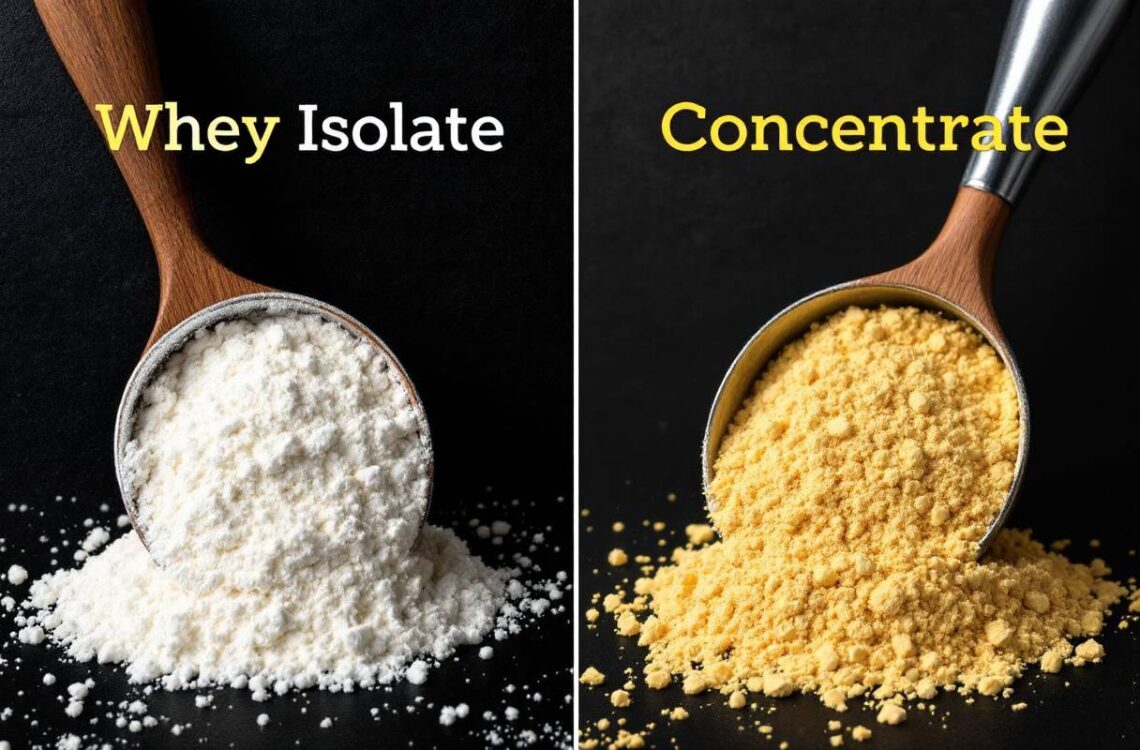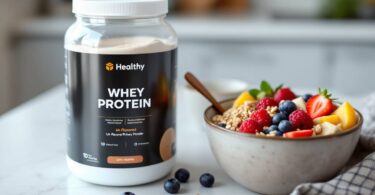Ever wondered why some fitness enthusiasts swear by whey isolate while others stick to concentrate?
Dive into the world of protein powders, where the battle between whey isolate and concentrate rages on. Whether you’re a gym rat looking to bulk up or a health-conscious individual aiming for better nutrition, understanding these protein powerhouses can be a game-changer.
Get ready to unravel the mystery behind these muscle-building marvels and discover which one might be your perfect workout companion. It’s time to decode the differences and unveil the secrets of whey isolate vs concentrate!
Whey Protein Basics
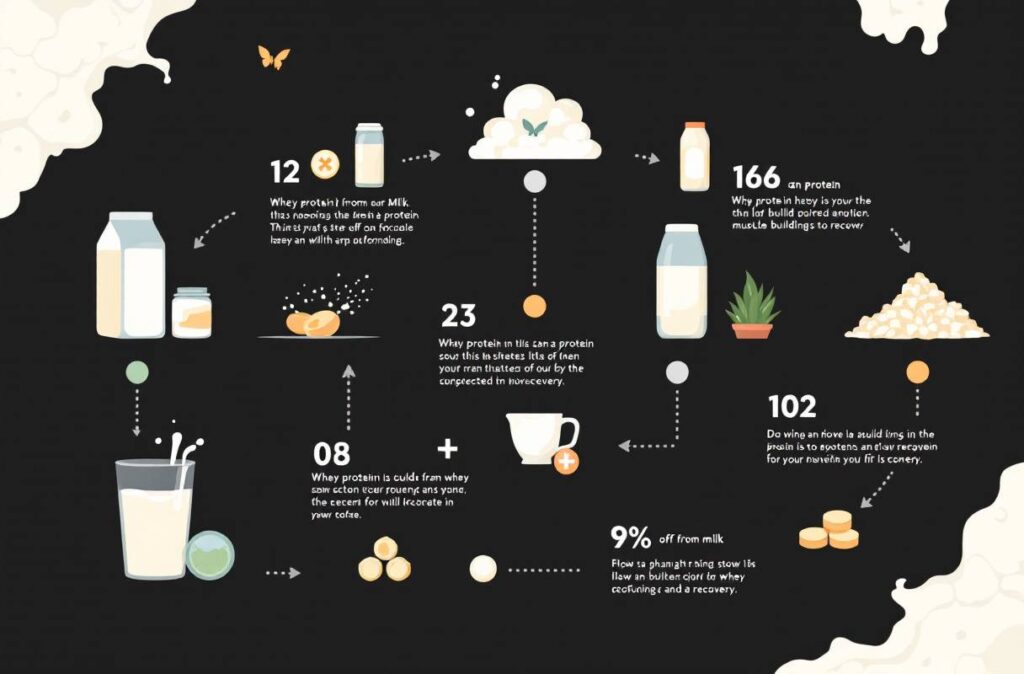
Importance of Protein in Fitness
Protein’s the unsung hero for anyone chasing their fitness dreams, whether they’re budding athletes or just gym regulars. It’s the magic ingredient for fixing muscles, helping them grow stronger, and bouncing back after a workout. Eating enough protein keeps those muscles going strong and boosts how well you play your game, whether it’s on the field or at the gym. Enter protein supplements like whey, the go-to for many fitness fans who want to make sure they’re hitting their daily protein target. Curious for more? Dive into our whey protein guide for the juicy details.
Whey Protein Overview
Think of whey protein as a hidden gem from making cheese. It’s packed with amino acids, making it an A+ choice for folks looking toward muscle wins. Whey comes in flavors, with isolate and concentrate being crowd favorites. Each has its perks, fitting different fitness hopes and meal plans. For a face-off between different protein kinds, don’t miss our piece on whey protein vs casein.
Key Differences Between Whey Isolate and Concentrate
Knowing what sets whey isolate apart from concentrate can zero in on the best pick for you. Here’s a quick peek at what makes them tick:
| Feature | Whey Isolate | Whey Concentrate |
|---|---|---|
| Protein Punch | 90-95% | 70-80% |
| Carbs | 0-2% | 3-8% |
| Fats | 0-1% | 1-5% |
| Lactose Level | Super Low | Higher |
| Processing | More Tweaked | Less Tweaked |
- Protein Punch: Whey isolate packs more protein power, perfect for those who want a serious boost.
- Carbs and Fats: With fewer carbs and fats, isolate’s a lean, mean option.
- Lactose Level: Isolate has less lactose, so it’s a savior for the lactose-sensitive crowd.
- Processing: Isolate undergoes more tweaking to strip away extra fats and carbs.
These goodies can guide your whey pick depending on your fitness dreams and diet quirks. For a detailed lowdown on picking the right whey, check out choose whey protein.
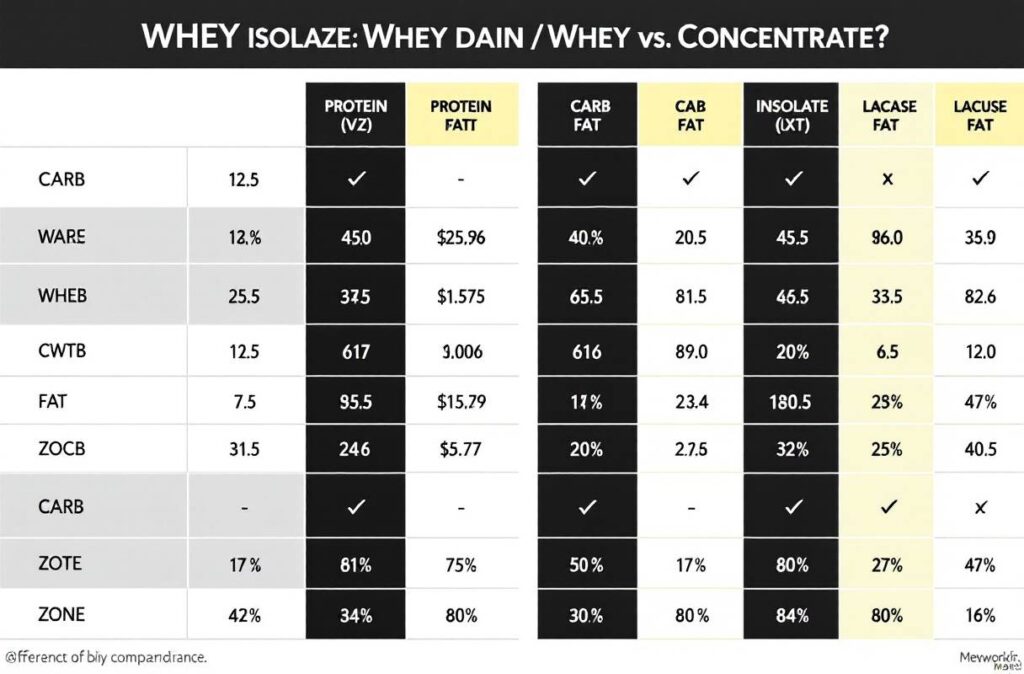
Armed with these insights, picking the whey protein that suits your style—be it for faster recovery, boosting muscles, or just amping up your protein—gets a whole lot easier. Plus, if you’re itching for some new recipe ideas with whey, swing by our whey protein smoothie recipes.
Whey protein isolate is the purest protein source available, with protein concentrations of 90% or higher.” – Dr. Stuart Phillips, Professor of Kinesiology at McMaster University
Whey Isolate Unraveled
Whey isolate is the go-to magic dust for gym junkies and bodybuilders. Here you’ll get the lowdown on what this muscle-building wonder is all about, straight from the cow’s milk to your shaker bottle.
What is Whey Isolate?
Think of whey isolate as the skinny jeans of the protein powder world. It’s milk’s protein, stripped down to its protein-packed finest form – over 90% pure muscle-food. This kind of whey is like the Usain Bolt of proteins – super fast at breaking down in your body, so it’s a hit with athletes chasing that extra protein kick.
Production Process
Got milk? Sure, but here’s how they turn it into muscle magic called whey isolate:
- Curds & Whey: Remember Little Miss Muffat? She was on to something. This is where milk separates into curds and good owl’ whey.
- Filtration Fun: Next, the whey is put through a fancy filter party, where fats and lactose get shown the door. This part’s like milk hitting the gym – protein gets all buffed up.
- Shocking Science: Time for some ion exchange. This bit sounds like a science class but just means getting rid of any freeloaders to make super pure protein.
- From Wet to Dry: Finally, they dry the thing into a powder. Ta-da! You now have some lean, mean protein.
This whole shebang ensures that your whey isolate stays lean and clean – ticking off those fats and carbs and leaving ‘me in the dust.
Benefits of Whey Isolate
Whey isolate is like the Swiss Army knife of supplements, especially if your life includes lots of sweat and barbells. Here’s why you might want to make it your buddy:
- Protein Power: With 90% or more protein, it’s a primo choice for a protein punch.
- Fat and Carb Ghosting: Hardly any fat or carbs means it won’t mess with your caloric wizardry.
- Speedy Gonzalez: Your body soaks it up faster than a sponge, perfect for if you’re trying to bounce back from that workout.
- Lactose Lowdown: Tiny lactose levels wave hello to people who usually have milk tummy troubles. Want more on that? Check out our take on lactose-free whey.
| Nutrient | Whey Isolate (per serving) |
|---|---|
| Protein | 90-95% |
| Carbs | 0-3% |
| Fat | 0-2% |
| Lactose | <1% |
Whey isolate’s like a secret ingredient you can toss into smoothies, meals, or just mix with water and chug down. For recipes, hit up our whey protein smoothie ideas.
Sorting out the whey isolate from the pack helps you pick what matches your diet dreams. Want to know more? Scope out our whey protein breakdown and top whey picks.
Whey Concentrate: Let’s Break It Down
What is Whey Concentrate?
Whey protein concentrate is the magic stuff that surfaces when making cheese. Imagine a mix that packs a good punch of protein, anywhere between a third and four-fifths of the scoop. It’s the go-to for folks who want quality protein without emptying their wallets.
How’s It Made?
Turning milk into whey concentrate is like a step-by-step kitchen experiment:
- Milk Separation: It starts with splitting milk into solid curds and the liquid called whey.
- Filtration Fun: That liquid gets a good cleaning to ditch fats and sugars but keep the protein goodies.
- More Protein, Please: Finally, the whey gets all dried up into a protein-packed powder.
These steps keep all the good stuff intact, so you’re not missing out when adding it to your diet.
What’s in It for You?
Whey concentrate is a hot favorite for good reasons, especially among the fitness crowd:
- Friendly on the Wallet: This stuff won’t make you broke, unlike its flashy cousin, whey isolate.
- Loaded with Extras: Beyond just protein, it’s got little helpers like growth factors that support your overall wellness.
- Lactose Level: Contains some lactose but is usually fine for folks who aren’t super sensitive.
- Tasty Stuff: Praised for its flavor and mouthfeel, fitting well into recipes—like when blending up some tasty whey protein smoothies.
Check out this quick rundown of what you’re getting:
| Nutrient | Whey Concentrate |
|---|---|
| Protein Content (per serving) | 30% – 80% |
| Carb Content (per serving) | 3 – 8 grams |
| Fat Content (per serving) | 1 – 3.5 grams |
| Calories (per serving) | 110 – 150 |
For those scratching their heads about the whole protein supplement world, our whey protein guide and the article on choose whey protein are gold mines of info. Picking the right whey protein concentrate can get you closer to those health goals and taste preferences you’re aiming for!
Nutritional Match-Up
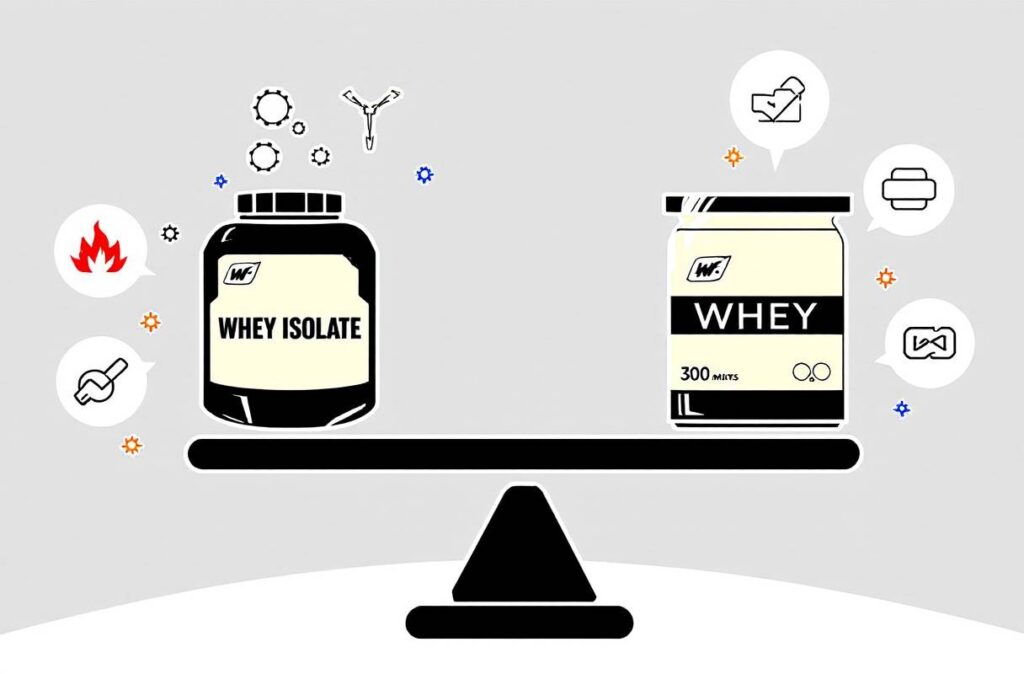
Let’s have a smackdown between whey isolate and whey concentrate to milk out their nutritional goodies. They’re not exactly twins—more like siblings with different vibes, each one tickling the taste buds and diet plans uniquely.
Both whey isolate and concentrate are excellent sources of high-quality protein, but they differ in their macronutrient profiles and how they’re processed.” – Alan Aragon, MS, Nutrition researcher and author
Protein Battle
Whey isolate flexes its muscles with a booming protein punch that makes gym fans swoon, perfect for those wanting Schwarzenegger-level gains and next-day recovery. Meanwhile, whey concentrate throws a decent protein punch too, but it keeps a little extra of the food love as it’s less pruned during processing.
| Nutrient | Whey Isolate (per 100g) | Whey Concentrate (per 100g) |
|---|---|---|
| Protein | 90-95g | 70-80g |
Carbs and Fat Face-off
When they strip down whey isolate, carbs and fats are almost kicked to the curb, making it the low-carb, low-fat king for diet warriors. Whey concentrate? It’s got a bit more of nature’s sweetness with its untouched carbs and fats—since it’s closer to its dairy roots.
| Nutrient | Whey Isolate (per 100g) | Whey Concentrate (per 100g) |
|---|---|---|
| Carbohydrates | 0-3g | 5-8g |
| Fats | 0-1g | 3-5g |
If you’re curious ’bout how this plays out in your health game, hop over to our whey protein guide.
Calorie Counter
Whey isolate is the lighter contender here because it kicks fats and carbs out of the ring. On the other hand, whey concentrate beefs up the calorie count, perfect if you’re on a bulking mission or just need more oomph in your energy tank.
| Nutrient | Whey Isolate (per 100g) | Whey Concentrate (per 100g) |
|---|---|---|
| Calories | 350-370 | 400-420 |
Knowing what’s in your protein supplement is like knowing the moves before a dance-off—pick the one that suits your rhythm and goals. For more juicy insights, check out our rundown on best whey protein powders and tips for whey protein lean muscle.
Suitability and Digestibility
When you’re eyeballing whey isolate vs. concentrate, think about how easy these are on the tummy and who they’re best for. These things can make or break how folks handle these protein pals.
Lactose Content
So, lactose is that tricky sugar lurking in dairy. Some bellies just don’t like it. Whey isolate goes through extra scrubbing to ditch most of that lactose. This makes it a solid pick for those who say, “No, thanks,” to lactose or dairy. On the flip, whey concentrate says, “Hey, I’ve got more lactose here,” which might mean trouble for the lactose-averse.
| Whey Type | Lactose Content (g per 100g) |
|---|---|
| Whey Isolate | Less than 1 |
| Whey Concentrate | 3 to 4 |
If lactose makes you squirm, hop over to our piece on lactose-free whey protein for more scoop.
Protein Absorption Rate
Speed matters, especially when it’s about chomping down on proteins and getting them into your system. Both whey isolate and concentrate are quick on the draw, making them great for when you’ve just sweat it out. But, isolate might give you that extra edge because it’s cleaner and less cluttered with fats and sugars. That lightning speed is a win for those who want to feed their muscles pronto post-gym grind. Concentrate’s still fast, just a tad slowed by some extra goodies like fats and carbs.
| Whey Type | Absorption Rate (Digestive Speed) |
|---|---|
| Whey Isolate | Blazing Fast |
| Whey Concentrate | Fast |
Want the lowdown on how protein absorption jazzes up muscle recovery? Peek at our whey protein absorption article.
Allergen Concerns
Allergens are a biggie when picking between whey isolate and concentrate. Since they’re milk-derived, allergic folks, heads up. Isolate, with its extra polishing, is lighter on allergens compared to its concentrate cousin. A safer shot for those with small dairy hang-ups, though if dairy allergies are a major concern, getting a thumbs up from a healthcare guru is smart.
| Whey Type | Allergen Content |
|---|---|
| Whey Isolate | Low |
| Whey Concentrate | Mid-range |
Looking to skip dairy altogether? Our piece on vegan whey protein alternatives might be your cup of tea.
Knowing these juicy tidbits can arm fitness buffs and health geeks with what they need to pick between whey isolate and concentrate. For the ultimate rundown on snagging the whey protein that fits you like a glove, swing by our whey protein guide.
Performance and Muscle Gain
Muscle Protein Synthesis
So, you’ve hit the gym and you’re aiming to get swale, right? You’ll want to get friendly with Muscle Protein Synthesis (MPS), the body’s go-to process for repairing and growing those muscles. Whey protein, be it isolate or concentrate, is here to give MPS a high-five. These protein types are packed with amino acids that our muscles love.
| Type of Whey Protein | Leucine Content (per 100g) |
|---|---|
| Whey Isolate | 12g |
| Whey Concentrate | 10g |
Leucine is the top dog amino acid that gives MPS a good kickstart. Whey isolate usually packs more leucine than concentrate, meaning your muscles might just respond better to it. Curious for more cool facts? Pop over to our whey protein guide.
Recovery Time
If you’re all about pumping iron day in and day out, recovery time is your holy grail. Whey isolate and concentrate are like the pit crew for your muscles—fast and efficient.
| Type of Whey Protein | Digestion Speed (hrs) |
|---|---|
| Whey Isolate | 1-2 |
| Whey Concentrate | 2-3 |
Isolate’s your quick-fix post-workout snack as it gets digested faster than concentrate—just what your muscles ordered for a speedy recovery. For more geeky details on how your body handles whey, check whey protein absorption.
Muscle Growth
Building those guns and buns of steel is the ultimate quest. Both whey variants are in your corner, cheering for muscle hypertrophy with their high-protein punch.
| Type of Whey Protein | Protein Content (per 100g) |
|---|---|
| Whey Isolate | 90g |
| Whey Concentrate | 80g |
Isolate offers a bit more protein per scoop, a small edge for gaining muscle mass. Still, don’t count out concentrate; it’s no slouch. Want more juicy tidbits? Dive into our whey protein lean muscle article.
Bottom line: whether you’re on Team Isolate or Team Concentrate, understanding these whey options means you can tailor your protein choice to match those sweat-filled goals. Ready to blend some gains? Try our whey protein smoothie recipes and power up your workout menu.
Price and Affordability
Thinking about which whey protein to snag? Price tags can totally be a game changer. Whether you’re pinching pennies or ready to splurge a little, understanding the cost differences between whey isolate and whey concentrate can help you get the biggest bang for your buck.
Cost Differences
Whey protein prices jump around based on the type and how it’s made. Whey isolate usually costs more than whey concentrate—blame all that extra effort to make it super pure.
| Whey Type | Average Cost per Pound ($) |
|---|---|
| Whey Isolate | 15 – 20 |
| Whey Concentrate | 8 – 12 |
The reason it costs more? It’s all about the fancy filtering! Whey isolate sheds more fat and lactose, cranking up the protein power.
Value for Money
Talking cash, value, and nutrition—you got to weigh it all! Whey isolate brings more protein to your spoonful, fitting perfectly for those laser-focused on packing in the protein while keeping an eye on carbs and fats.
| Whey Type | Protein Content (%) | Example Cost per Gram of Protein ($) |
|---|---|---|
| Whey Isolate | 90 – 95 | 0.17 – 0.22 |
| Whey Concentrate | 70 – 80 | 0.10 – 0.14 |
Okay, so you pay more upfront for isolate, but it might be worth it if you’re all about those muscle gains or watching your weight. High protein, less fuss.
Decision Factors
How do you choose between isolate and concentrate? It’s like picking shoes—depends on your goals, your body, and your wallet.
Personal Goals: If you’re all about muscles and recovery, that rich-in-protein whey isolate could be your new best friend. But, if you’re into general fitness, whey concentrate is a solid deal. Check out more about whey protein for lean muscle to see what fits your vibe.
Dietary Restrictions: If lactose makes you queasy, whey isolate might be the way to go, since it packs way less lactose. Curious about it? Jump over to our scoop on lactose-free whey protein.
Budget Constraints: Tighten those purse strings? No worries—whey concentrate keeps your protein dreams alive without emptying your bank account. Nailing that balance between quality and cost makes sure your nutrition doesn’t take a backseat.
For more on dialing in your whey choice, check out our whey protein guide for all the details you didn’t know you needed. Make your decision with all the facts in hand!
Choosing the Right Option
Figuring out the best choice between whey isolate and whey concentrate is like picking between two types of pizza—you gotta know what you like and what works for you. They each bring their own pizzazz to the table, influenced by your personal goals and any dietary quirks.
Personal Goals
Folks often grab onto whey isolate or concentrate depending on what they’re aiming for in their health and fitness escapades. Whether you’re bulking up, trimming down, or just keeping things balanced, both types of whey protein can play their part.
- Muscle Gain: If you’re on a muscle-building mission, whey isolate could be your buddy. It packs a protein punch and gets digested lickety-split, perfect for bouncing back after a tough gym session. Dive into the diets on muscle protein synthesis.
- Weight Loss: Keeping an eye on those calories? Whey isolate, with fewer carbs and fat, might be your secret weapon. Learn more about shaking off the pounds with whey protein for weight loss.
- General Health: For those on the quest for good overall health, either type will do the trick. The pick might boil down to your palate or wallet.
| Goal | Whey Isolate | Whey Concentrate |
|---|---|---|
| Muscle Gain | High Protein | Moderate Protein |
| Weight Loss | Low Carb, Low Fat | Moderate Carb, Fat |
| General Health | Suitable | Suitable |
Take a peek at other gems like whey protein lean muscle if you want to dive into what protein makes sense for your goals.
Dietary Restrictions
Sometimes, what you can or can’t eat decides the winner between whey isolate and concentrate. These needs may shove the scale one way or another.
- Lactose Intolerance: Less lactose in whey isolate makes it a lifesaver for those whose tummies don’t play well with milk sugar. For more, skim through lactose-free whey protein.
- Caloric Intake: Counting calories? Whey isolate can help keep those numbers in check with its lower caloric hit.
- Allergens: If milk allergies are in the mix, tread carefully. You might be better off with options like vegan whey protein.
Consultation with a Nutritionist
Bringing a nutritionist into the mix can turn guesswork into a plan. They can help you chart a course based on your health story, fitness dreams, and taste buds.
- Personalized Advice: They’ll whip up a plan that fits like a glove, thinking about how whey protein weaves into your diet with style.
- Nutrition Tips: Make sure you’re not missing any checkboxes on the nutrition front.
- Health Monitoring: They’ll help keep tabs on how you’re handling things and tweak your intake as needed.
Whether your heart’s set on whey isolate, concentrate, or something else entirely, a little nudge from a pro can make your choice a no-brainer. For more scoop, take a look at our whey protein guide or get tips on choosing whey protein that’s right on the money for you.
Conclusion
As we’ve unmasked the secrets of whey isolate and concentrate, it’s clear that both pack a protein punch for your fitness journey.
Isolate shines with its purity and rapid absorption, making it a go-to for serious athletes and those watching their macros. Concentrate, on the other hand, offers a wallet-friendly option with a fuller nutrient profile.
Remember, your choice boils down to your unique goals, dietary needs, and budget. Whether you’re aiming for muscle gains, weight loss, or overall health, there’s a whey protein that fits the bill. So, flex those newfound knowledge muscles and pick the protein that’ll power your path to peak performance. Your body will thank you for making an informed choice in this whey-ty decision!
Additional resources
American Journal of Clinical Nutrition: Protein and Exercise
Journal of the International Society of Sports Nutrition: Whey Protein Supplementation
FAQs about Whey Isolate vs Concentrate
1: Which is better for weight loss, whey isolate or concentrate?
Whey isolate is generally better for weight loss due to its lower calorie, fat, and carb content. However, both can be effective when used as part of a balanced diet and exercise program.
2: Can lactose-intolerant individuals consume whey protein?
Whey isolate is typically a better choice for lactose-intolerant individuals as it contains very little lactose. Some people with mild lactose intolerance may still be able to tolerate whey concentrate.
3: Is whey isolate worth the extra cost compared to concentrate?
It depends on your goals. If you’re a serious athlete, bodybuilder, or have specific dietary restrictions, the extra cost of whey isolate may be justified. For general fitness and nutrition, whey concentrate often provides good value.
4: How much protein should I consume daily when using whey supplements?
The recommended daily protein intake varies based on factors like body weight, activity level, and fitness goals. Generally, 1.6 to 2.2 grams of protein per kilogram of body weight is recommended for active individuals.
5: Can I mix whey isolate and concentrate?
Yes, you can mix whey isolate and concentrate to balance the benefits of both. This can provide a good mix of fast-absorbing protein (isolate) and additional nutrients (concentrate).
6: Are there any side effects of consuming whey protein?
While generally safe, some people may experience digestive issues, bloating, or allergic reactions. It’s important to start with small amounts and consult a healthcare professional if you have concerns.

